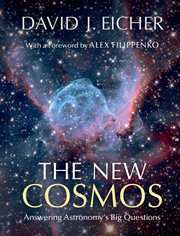Book contents
- Frontmatter
- Dedication
- Contents
- Foreword
- Preface
- Acknowledgments
- 1 The awakening of astronomy
- 2 How the Sun will die
- 3 The end of life on Earth
- 4 How the Moon formed
- 5 Where has all the water gone?
- 6 Why did Venus turn inside-out?
- 7 Is Pluto a planet?
- 8 Planets everywhere…
- 9 The Milky Way as barred spiral
- 10 Here comes Milkomeda
- 11 The Big Bang's cosmic echo
- 12 How large is the universe?
- 13 The mystery of dark matter
- 14 The bigger mystery of dark energy
- 15 Black holes are ubiquitous
- 16 What is the universe's fate?
- 17 The meaning of life in the universe
- Glossary
- Bibliography
- Index
16 - What is the universe's fate?
Published online by Cambridge University Press: 05 December 2015
- Frontmatter
- Dedication
- Contents
- Foreword
- Preface
- Acknowledgments
- 1 The awakening of astronomy
- 2 How the Sun will die
- 3 The end of life on Earth
- 4 How the Moon formed
- 5 Where has all the water gone?
- 6 Why did Venus turn inside-out?
- 7 Is Pluto a planet?
- 8 Planets everywhere…
- 9 The Milky Way as barred spiral
- 10 Here comes Milkomeda
- 11 The Big Bang's cosmic echo
- 12 How large is the universe?
- 13 The mystery of dark matter
- 14 The bigger mystery of dark energy
- 15 Black holes are ubiquitous
- 16 What is the universe's fate?
- 17 The meaning of life in the universe
- Glossary
- Bibliography
- Index
Summary
Astronomy and astrophysics are filled with countless questions, and are slowly gaining some pretty impressive answers. Certainly, one of the most fundamental questions of all, one that stretches back perhaps the longest in philosophical terms in the human mind, is one of the simplest: What will become of the universe?
This elegant question is not an easy one to answer. We know that as we look out into space, we're looking back into time. The distant universe is a snapshot of what existed billions of years ago, and we do not have an accurate picture of many of the objects we see as they really are now, at this exact point in time. Knowing the status of objects in the universe in the “here and now” works very well for our solar system, for Earth, the Sun, and our family of planets, asteroids, and comets. But as we look progressively out even into our Milky Way Galaxy, we begin to see things as they were, more so as distances increase. So how do we predict what will happen well down the road in the universe's future? To predict how the cosmos will end? It is a stupefyingly difficult problem.
To predict the universe's future, astronomers would like to know all about its current physical parameters, as well as the models of cosmology that they believe most strongly in. We have already seen that the current size of the universe is at least 46 billion light-years in each direction from where we are, and that it could be larger yet if cosmic inflation theory is correct, which nearly everyone believes is so. What about the shape of space? According to general relativity, space is curved by a degree set by the average density of matter within it. So exactly how dense the universe is becomes a really big question. Space might be flat, positively curved like a balloon, or negatively curved like an equestrian saddle.
But actually measuring the shape of space is really tough. Measuring distances to and velocities of countless stars and galaxies failed to provide the answer to the universe's shape. Instead, cosmologists now look to the cosmic microwave background radiation, and subtle variabilities within it, to infer the shape of the cosmos.
- Type
- Chapter
- Information
- The New CosmosAnswering Astronomy's Big Questions, pp. 212 - 223Publisher: Cambridge University PressPrint publication year: 2015



